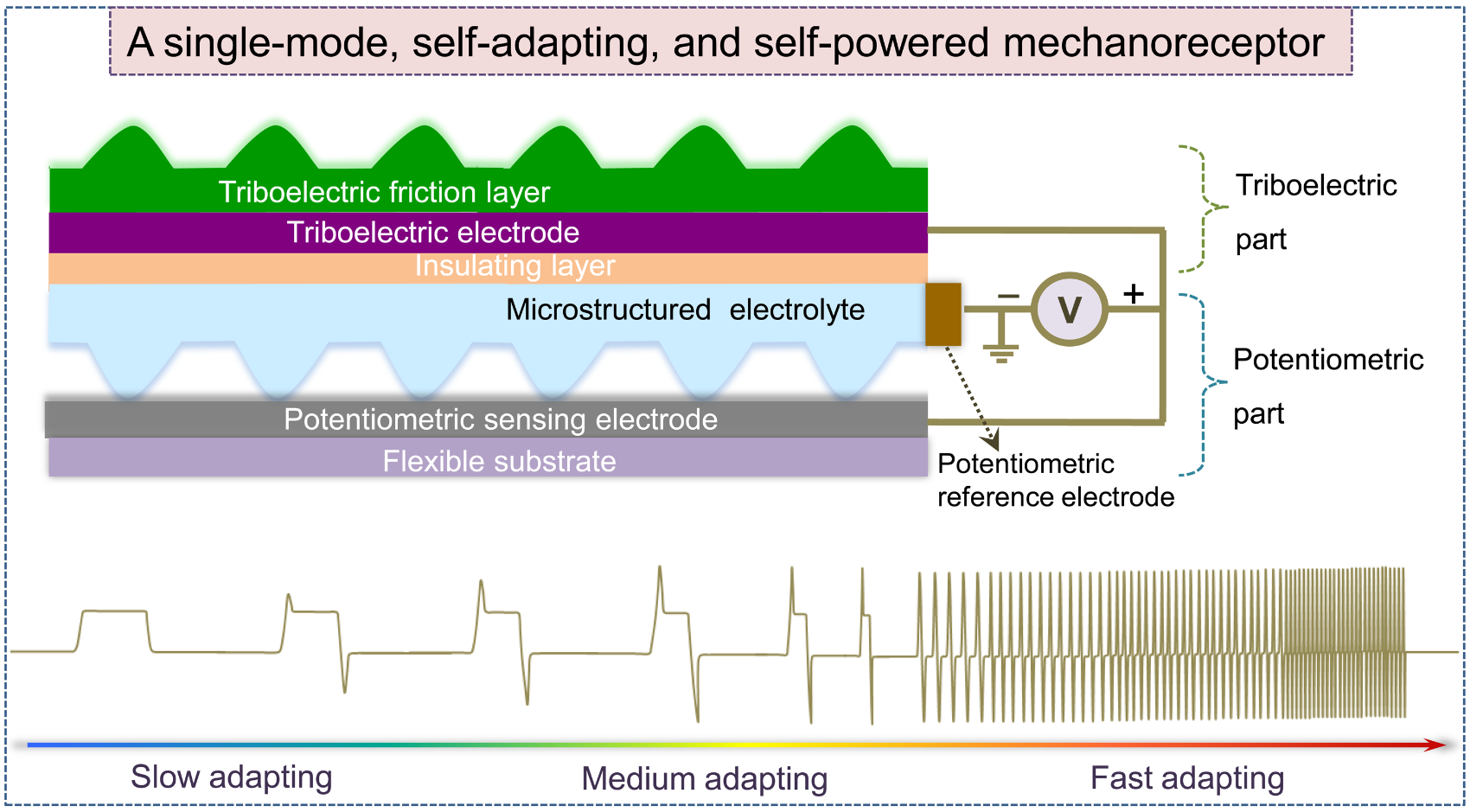Xiaodong and Juan’s Paper in Advanced Materials. Congrats!!!
Paper title: A Single-Mode, Self-Adapting, and Self-Powered Mechanoreceptor Based on a Potentiometric–Triboelectric Hybridized Sensing Mechanism for Resolving Complex Stimuli
Abstract: Human skin is equipped with slow adapting (SA) and fast adapting (FA) capabilities simultaneously. To mimic such functionalities, elaborately designed devices have been explored by integrating multiple sensing elements or adopting multimode sensing principles. However, the complicated fabrication, signal mismatch of different modules, complex operation, and high power-consumption hinder their widespread applications. Here, a new both SA and FA via seamless fusion of complementary while compatible potentiometric and triboelectric sensing principles is reported. The resultant potentiometric–triboelectric hybridized mechanoreceptor exhibits distinctive features that are hard to achieve via currently existing methods, including single-mode output (only voltage signal), greatly simplified operation (singlemeasurement setup), ultralow power-consumption (<1 nW), self-adaptive response behavior, and good capability for resolving complex stimuli. Diverse mechanical characteristics, including magnitude, duration, frequency, applying and releasing speed, can be well interpreted with this single-mode and self-powered mechanoreceptor. Its promising application for monitoring object manipulations with a soft robotic gripper is explored. Furthermore, the versatility of the mechanoreceptor for resolving complex stimuli in diverse daily scenarios is demonstrated. This work presents a new design that will significantly simplify the fabrication/operation and meanwhile boost the functionality/energy-efficiency of future electronic devices and smart systems.
Publication:
-

A Single-Mode, Self-Adapting, and Self-Powered Mechanoreceptor Based on a Potentiometric–Triboelectric Hybridized Sensing Mechanism for Resolving Complex Stimuli
Xiaodong Wu,
Juan Zhu,
James W.,
and
Ana C. Arias
Advanced Materials,
2020
,
2005970.
[Abstract]
[Bibtex]
[PDF]
Human skin is equipped with slow adapting (SA) and fast adapting (FA) capabilities simultaneously. To mimic such functionalities, elaborately designed devices have been explored by integrating multiple sensing elements or adopting multimode sensing principles. However, the complicated fabrication, signal mismatch of different modules, complex operation, and high power-consumption hinder their widespread applications. Here, a new both SA and FA via seamless fusion of complementary while compatible potentiometric and triboelectric sensing principles is reported. The resultant potentiometric–triboelectric hybridized mechanoreceptor exhibits distinctive features that are hard to achieve via currently existing methods, including single-mode output (only voltage signal), greatly simplified operation (singlemeasurement setup), ultralow power-consumption (<1 nW), self-adaptive response behavior, and good capability for resolving complex stimuli. Diverse mechanical characteristics, including magnitude, duration, frequency, applying and releasing speed, can be well interpreted with this single-mode and self-powered mechanoreceptor. Its promising application for monitoring object manipulations with a soft robotic gripper is explored. Furthermore, the versatility of the mechanoreceptor for resolving complex stimuli in diverse daily scenarios is demonstrated. This work presents a new design that will significantly simplify the fabrication/operation and meanwhile boost the functionality/energy-efficiency of future electronic devices and smart systems.
@article{XiaodongMechanoreceptorAM,
author = {Wu, Xiaodong and Zhu, Juan and W., James and and Arias, Ana C.},
title = {A Single-Mode, Self-Adapting, and Self-Powered Mechanoreceptor Based on a Potentiometric–Triboelectric Hybridized Sensing Mechanism for Resolving Complex Stimuli},
year = {2020},
doi = {10.1002/adma.202005970},
publisher = {Advanced Materials},
url = {https://onlinelibrary.wiley.com/doi/10.1002/adma.202005970},
journal = {Advanced Materials},
volume = {},
number = {2005970},
thumbnail = {XiaodongMechanoreceptorAM.PNG},
pdf = {XiaodongMechanoreceptorAM.pdf}
}